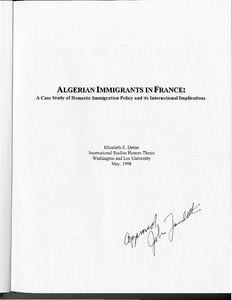| dc.description.abstract | My paper examines the history of immigration in France, the positive and negative aspects of the public policy ofintegration in France, and the alternative means ofincorporating immigrants into
mainstream French society. In Chapter 1, I debunk the argument that immigrants steal jobs from natives, and I detail the history of immigration in France over the last century. Chapter 2 explores
the process of nation-building in France, with a theoretical basis formed by Anthony Smith and Ernest Gellner' s writings on nationalism. In connection with nationalism, racism and the modem
political scene are discussed, with reference to Count Arthur de Gobineau and Jean-Marie Le Pen. In Chapter 3, I argue that the current French integrative model articulated by Dominque Schnapper
and Patrick Weil is comparatively superior to the Anglo-Saxon multicultural approach promoted by John Rex and others. Chapter 3 also discusses the contentious issue of Muslim comm unitarianism
in France. I make use of writings by Gilles Kepel, Oliver Roy and Bernard Lewis, among others, in determining that a true community of Muslims cannot be found. Chapter 4 discusses the differences between Islam and the West on a larger scale. Rafiq Zakaria, Samuel Huntington and John Gray provide the intellectual foundation of that chapter. My argument rests on the idea that despite the difficulties of integration, the alternatives are worse. The "different but equal" approach of multiculturalism can lead to factionalism. Multiculturalism fragments society into numerous ethnic subcultures, undermines political cohesion and destroys the shared national culture valued by the French. Moreover, as Huntington asserts, multiculturalism sabotages international security by perpetuating an international ethnic diaspora. Integration is possible only when a nation adheres to a common ideology; in the case of France it is the republican triad of liberty, fraternity and equality. While integration may be effected domestically, universal adherence to one set of principles is not feasible, and I caution against applying the principles of integration on a global scale. Finally, I advocate pluralism as an alternative to liberal nihilism. In the years since the collapse of the Soviet Union, international relations theorists have been preoccupied with understanding the new world order. Some authors, like Francis Fukyama, have determined that the triumph of liberalism is at hand. Others, like Huntington and Gray, scoff at such illusions of the universalism of liberalism -- an idea, they say, that results from Eurocentric thinking. The modem challenge to international relations is to come to terms with a world no longer divided into two distinct ideological camps hellbent on destroying each other, but home to a variety of ideologies, religions and races. In short, internationalists of today must learn tolerance of inter-civilizational differences if we are to avoid large-scale conflicts in the future. [From Introduction] | en_US |
| dc.rights | This material is made available for use in research, teaching, and private study, pursuant to U.S. Copyright law. The user assumes full responsibility for any use of the materials, including but not limited to, infringement of copyright and publication rights of reproduced materials. Any materials used should be fully credited with the source. | en_US |
